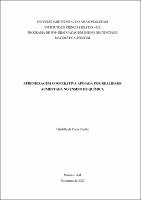| ???jsp.display-item.social.title??? |


|
Please use this identifier to cite or link to this item:
https://tede.ufam.edu.br/handle/tede/8237| ???metadata.dc.type???: | Dissertação |
| Title: | Aprendizagem cooperativa apoiada por realidade aumentada no ensino de química |
| Other Titles: | Cooperative learning supported by augmented reality in chemistry teaching |
| ???metadata.dc.creator???: | Coelho, Filadelfo da Costa  |
| ???metadata.dc.contributor.advisor1???: | Magalhães Netto, José Francisco de |
| ???metadata.dc.contributor.referee1???: | Souza, Renato Henriques de |
| ???metadata.dc.contributor.referee2???: | Santana, Genilson Pereira |
| ???metadata.dc.description.resumo???: | O presente trabalho tem como objetivo analisar a Aprendizagem Cooperativa apoiada por Realidade Aumentada como auxílio do Ensino de Química a partir de uma abordagem em Reações de Compostos Orgânicos. Para atingir os objetivos, utilizou-se um estudo com o intuito de verificar os benefícios que a RA trará para educação. A partir disso, foi desenvolvido um aplicativo de Realidade Aumentada com a utilização da técnica de Jigsaw I que permitiu o estudo em grupos com interações conjuntas entre professor e aluno. Também possibilitou ao estudante visualizar em três dimensões as reações orgânicas através de dispositivo móveis e marcadores. Os trabalhos em grupos permitiram as interações com resultantes nos aspectos cognitivos, com isso, foi trabalhado a partir de conceitos de Vygotsky sobre a Zona de Desenvolvimento Proximal ZDP. A apresentação e utilização desse estudo proporcionaram ao professor e ao aluno a capacidade de vivenciar uma nova forma de ensinar e aprender, com benefícios no rendimento escolar. Acreditamos que uma forma integrada de abordar o ensino de ciências, em que a Química dialoga com o professor, aluno e mediador de aprendizagem, ajuda a proporcionar ao estudante a construção de um pensamento Químico conciso que se ramifica em séries posteriores. Com este estudo foi possível verificar inicialmente que 31,4% dos alunos tinham um rendimento abaixo do esperado, ao fim do experimento reduziu-se para 9.2%, logo, a recuperação para o rendimento aceitável foi para 22,2% que conseguiram recuperar. No experimento 60% dos grupos de aprendizagem cooperativa conseguiram rendimento maior que outros grupos de aprendizagem. Este resultado destaca a importância de se trabalhar com estas perspectivas de aprendizagem, unindo trabalhos em grupos cooperativos e tecnologias atrativas que possam colaborar de forma eficaz para construção de conhecimento nas disciplinas escolares. |
| Abstract: | The present work aims to analyze cooperative learning supported by Augmented Reality as aid of Chemistry Teaching from an approach in Organic Compound Reactions. To achieve the objectives, a case study was used in order to verify the benefits that AR will bring to education. From this, an Augmented Reality application was developed using the Jigsaw I technique that allowed the study in groups with joint interactions between teacher and student. It also allowed the student to visualize in three dimensions the organic reactions through mobile devices and markers. The group studies allowed the interactions with resulting cognitive aspects, with this, it was worked from Vygotsky's concepts about the Proximal Development Zone PDZ. The presentation and use of this study provided the teacher and student with the ability to experience a new way of teaching and learning, with benefits in school performance. We believe that an integrated way of approaching science teaching, in which Chemistry dialogues with the teacher, student and learning mediator, helps to provide the student with the construction of a concise chemical thought that branches into later grades. With this study it was possible to initially verify that 31.4% of the students had a lower than expected income, at the end of the experiment it decreased to 9.2%, so the recovery for acceptable income was to 22.2% who were able to recover. In the experiment, 60% of the cooperative learning groups achieved higher income than other learning groups. This result highlights the importance of working with these learning perspectives, uniting work in cooperative groups and attractive technologies that can collaborate effectively to build knowledge in school disciplines. |
| Keywords: | Ensino de Química Reações de Compostos Orgânicos Cooperative Learning Zona de Desenvolvimento Proximal Processo de aprendizagem |
| ???metadata.dc.subject.cnpq???: | CIÊNCIAS EXATAS E DA TERRA |
| ???metadata.dc.subject.user???: | Aprendizagem Cooperativa Realidade Aumentada Química |
| Language: | por |
| ???metadata.dc.publisher.country???: | Brasil |
| Publisher: | Universidade Federal do Amazonas |
| ???metadata.dc.publisher.initials???: | UFAM |
| ???metadata.dc.publisher.department???: | Instituto de Ciências Exatas |
| ???metadata.dc.publisher.program???: | Programa de Pós-graduação em Ensino de Ciências e Matemática |
| Citation: | COELHO, Filadelfo da Costa. Aprendizagem cooperativa apoiada por realidade aumentada no ensino de química. 2020. 114 f. Dissertação (Mestrado em Ensino de Ciências e Matemática) - Universidade Federal do Amazonas, Manaus, 2020. |
| ???metadata.dc.rights???: | Acesso Aberto |
| ???metadata.dc.rights.uri???: | http://creativecommons.org/licenses/by-nd/4.0/ |
| URI: | https://tede.ufam.edu.br/handle/tede/8237 |
| Issue Date: | 10-Mar-2021 |
| Appears in Collections: | Mestrado em Ensino de Ciências e Matemática |
Files in This Item:
| File | Description | Size | Format | |
|---|---|---|---|---|
| Dissertação_FiladelfoCoelho_PPGECIM.pdf | Dissertação_FiladelfoCoelho_PPGECIM | 3.94 MB | Adobe PDF |  Download/Open Preview |
This item is licensed under a Creative Commons License





